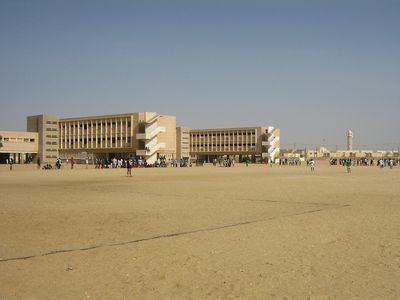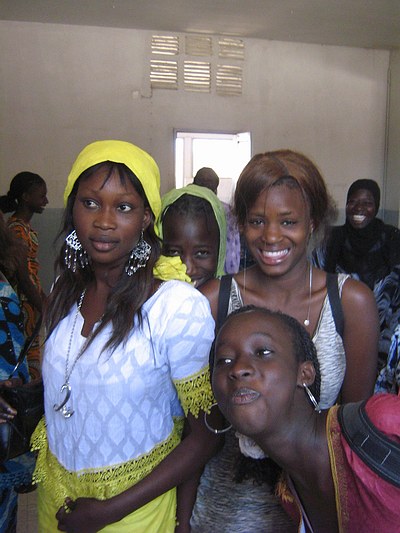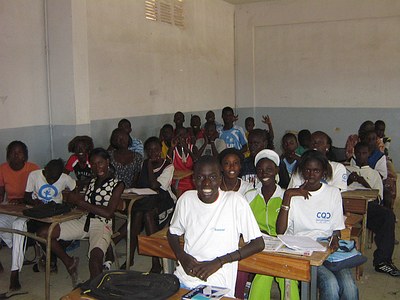| ||
The School
The principle object of my stay was to act as a teaching assistant to local English teachers. I helped out at Guillabert School, a large secondary with something like 1400 pupils. The school itself was an uninspiring concrete structure within sandy sports fields.

The school and grounds
My assignment was as an assistant teach to Mr Fall, a junior English teacher. I first met him in the staff-room immediately before a lesson. My initial reaction was of one of serious concern as in our first exchanges it was clear that his English really wasn't that fluent, so I sat at the back of the class expecting the worst. In fact I quickly learned that teaching to a class of sixty beginners is a skill in its own that isn't closely related to how large a vocabulary you have. He gained my instant respect for his ability at making himself understood and engaging the class, especially compared to my initial rather clumsy efforts. My own performance in front of the class improved enormously during my stay, learning how to use repetition and how to engage the pupils interactively in what we were doing, and I owed it largely to watching him.
Mr Fall had four classes. Following the French system classes are labelled from the youngest, 6eme, to the oldest, 3eme. He had one class of 3eme, aged around 14, and three of 6eme, about 11 years old, though because failing students might repeat the year they could be older. All the classes had about sixty pupils; to all fit in they sat three to a desk designed for two. The classrooms were dull: peeling grey walls, dirty floors, no electric light and often no functioning door to keep out noise from outside. On the upside, there was always enough chalk for the board. They studied from a course book, shared amongst classes so they couldn't take it home. With photocopies prohibitively expensive this meant the only permanent record available to them was what they wrote in their exercise book, something I often forgot. The content of the course books was aimed at pupils from Francophone Africa, something that occasionally caused me problems. For a start I couldn't identify half the fruit in a picture of a market-stall. Worse, while taking a class about countries I had to subtly check with Mr Fall what the capital of Cameroon was and which languages were spoken in Guinea-Bissau. Yes, Yaounde and Portuguese, with a smattering of Mandinka, Pulaar and Balanta-Kentohe of course, but it's harder when you're at the front of the class.

Girls from the 3eme
The pupils were like kids anywhere: some were keen, some just wanted to be elsewhere. Mr Fall and I devised and gave out a test to the 6eme classes. It's fair to say that we did a pretty good job of separating out the weak from the strong, the marks ranging from 2 to 19 out of 20. An interesting pattern emerged across the three classes. In each the best performers tended to be girls who sat at the front and were most active in the lesson, but top of the pile would be a boy or two sitting at the back with his mates, clearly studying hard but too cool to look like he was making any effort. Most heartbreaking was a girl in one class who I didn't give a score to, if I were to do so it could only have been zero. She quite simply couldn't see the blackboard, I think due to cataracts. The last to finish her test, what she handed in was only just legible and made little sense. I'm not sure she could really see what she was writing. I was hard to see how she was benefiting from being in the school except socially; I did notice a few of her classmates looked after her. The school could actually select the pupils it wanted, and turned away those not deemed academically strong enough. Parents had to pay for their children to attend, but it wasn't a huge amount even by local standards. One of the 6eme classes, I was told, consisted of pupils who had not made the academic grade but whose parents had somehow managed to secure them a place anyway (perhaps through some additional informal exchange of funds, but this was never clarified). Thus "6eme E" was renowned as being the weakest class in the year, dim kids with connections. Mr Fall generously decided that this was "my" class for whom I would prepare and give all the lessons; presumably because they were so bad I couldn't do any damage. Initially I found teaching this class, and the others of the same age, to be quite hard as they had such a small background in English. Over time though I came to enjoy this more than the older classes, mainly because I was aware of exactly which English words they were familiar with. With more advanced classes I would have to guess, invariably over-estimating their competence. I developed a bit of a rapport with 6eme E. After the first lesson some of the girls were sweet enough to use their limited English to welcome me to their school. And they could be very enthusiastic in class if you caught the mood. If I asked a question they knew the answer to they would be desperate to be the one to answer it. Rather than just casually raise their arm to draw my attention, they would stand and shout "sir, sir, sir", or even go as far as trying to snatch the chalk from my hand.

Class 6eme E
Part of the problem was that it was quite a weak lesson out of the textbook, about the not-so-thrilling subject of growing tomatoes. I told Mr Fall about it afterwards and he gave me advice that I'm not sure I will bear in mind. "Oh I'm sorry", he said, "I should have told you, if they misbehave you must hit them." Thinking back to my own school days I remembered how we once treated a supply French teacher. At one point she received a tennis ball on the back of her head, and we spent a lesson throwing cucumber slices out of our sandwiches to stick as high as possible up the classroom wall. Perhaps she should have hit us. So on reflection, perhaps a lack of attention and a fight weren't such a bad return on a dull lesson about tomatoes. In my final lessons Mr Fall conducted the classes through enthusiastic renditions of "I Can Sing a Rainbow" and the pupils gave me their email addresses so I could send them links to my photos. The four weeks I was teaching passed very quickly and I was quite disappointed when it came to an end. | ||
|
